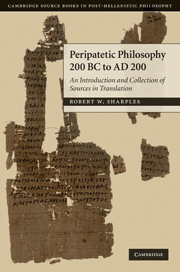Book contents
- Frontmatter
- Contents
- Preface
- Abbreviations
- Introduction
- Individuals
- Logic and ontology
- Ethics
- Physics
- Chapter 19 The nature of time and place
- Chapter 20 The eternity of the world
- Chapter 21 The heavens
- Chapter 22 God and providence
- Chapter 23 Fate, choice and what depends on us
- Chapter 24 Soul
- Chapter 25 Generation
- Chapter 26 Sensation
- Chapter 27 Intellect
- Bibliography
- Index of sources
- Index of passages cited
- Index of personal names (ancient)
- General index
Chapter 26 - Sensation
Published online by Cambridge University Press: 05 June 2012
- Frontmatter
- Contents
- Preface
- Abbreviations
- Introduction
- Individuals
- Logic and ontology
- Ethics
- Physics
- Chapter 19 The nature of time and place
- Chapter 20 The eternity of the world
- Chapter 21 The heavens
- Chapter 22 God and providence
- Chapter 23 Fate, choice and what depends on us
- Chapter 24 Soul
- Chapter 25 Generation
- Chapter 26 Sensation
- Chapter 27 Intellect
- Bibliography
- Index of sources
- Index of passages cited
- Index of personal names (ancient)
- General index
Summary
Galen, On the Opinions of Hippocrates and Plato 7.7.1–5 (CMG V.4.1.2 470.3–21 De Lacy 1978)
(1) Now since it was necessary for the organ of sight to be able to discriminate colours, it was made like light, since only such bodies are naturally altered by colours, as is made clear by the surrounding air, when it is most pure, being altered by colours. One can at any rate see, when someone is lying under a tree in such air[-conditions], the colour of the tree surrounding him. And bright air which touches the coloured surface of a wall often receives [the colour] and transmits it to another body, especially when the colour is deep blue or yellow or some other bright colour. Indeed, just as the light of the sun at sunrise makes all the air like itself just by touching it, in the same way [air] is immediately changed by colour. (2) These things, then, were stated most correctly by Aristotle, concerning the immediate change, close to instantaneous, of things that alter in this way, and, concerning this [change], that the bright air, when altered by colours, naturally transmits the alteration right up to the organ of sight. (3) But Aristotle did not say how we know the position or size or distance of each of the things we perceive. Many of his followers, reasoning about his doctrine, are caught out as wrong, since neither odours nor voices indicate the place from which they come, as has been shown in the fifth book of [my] On Demonstration.
Alexander of Aphrodisias, On the Soul 42.11–19
That light and transparent things that are illuminated are changed in some way by colours is clear from the fact that we see that [the light] becomes the same colour as many of the colours which are seen through it and takes on their colour. Gold makes it too seem golden, and purple purple, and pale green things grass-green. It is often possible to see the walls opposite such a colour, and the floor, as it were, stained with the colour of those things, and any people who may happen to be standing nearby, since what is illuminated, through being affected by those things, transmits such a colour to these too.
- Type
- Chapter
- Information
- Peripatetic Philosophy, 200 BC to AD 200An Introduction and Collection of Sources in Translation, pp. 257 - 265Publisher: Cambridge University PressPrint publication year: 2010



